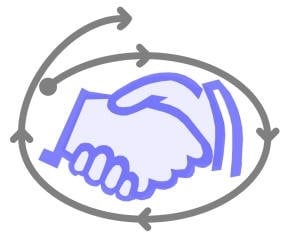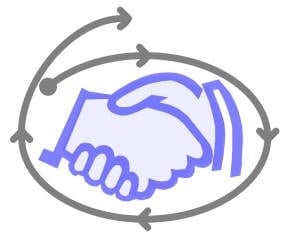I recently had the opportunity to attend a fascinating international conference on building donor trust, jointly presented by the BBB Wise Giving Alliance and the International Committee of Fundraising Organizations (ICFO).
Art Taylor, President and CEO of the BBB Wise Giving Alliance, explained that the four pillars of trust include ensuring good governance, providing quality financial information, being truthful in public communication, and continuously striving to achieve results. He stressed the impact of trust as breaches force those organizations who stand for doing things the right way have to work even harder to maintain trust.
People often do not conduct research prior to making charitable donations. Each of the four organizations recently accused of fraud had detailed information available on the BBB Wise Giving Alliance website indicating that they did not meet all standards. This is why the BBB Wise Giving Alliance seal is vital in advancing trust.
The conference included four very interesting panel sessions addressing the most challenging trust issues.
Cultural Differences that Influence Trust in Charities & Fundraising Strategies
Cultural differences exist that affect how characteristics of charitable organizations which are used as a basis for trust are perceived:
- Public executive salary data: publishing salary data is a priority in some countries, while privacy of such data is a priority in other countries.
- Board member compensation: board members may be expected to volunteer their time.
- Financial statement publication: detailed consistent financial statements are considered the norm in some countries and an added burden in others.
- Tax exemption status: the threshold involving the level of contribution to the public good and how that is defined varies.
The interpretation of data and supported conclusions can be very different when there is not a common understanding of data. We find this same situation frequently in our work with association analytics.
Gaining Donor Trust of New Generations
The panel focused on the popular topic of millennial donation behavior, while many of the conclusions surrounded the importance of taking a broader view of customer engagement along with user segmentation.
A common characteristic of millennial donors is that they value shared experiences with friends. To accommodate this, it is important to provide social communication tools. A specific example is a successful campaign where a charity did not request donations directly from previous donors, but instead requested that they ask their friends to donate.
The concept of engagement is relative to individual expectation. Millennials treat assets other than financial donations as equal, such as time and social actions. This is reflected in time and donation patterns that are common with millennials – they take longer period of time to donate and have a larger quantity of relatively small donations. Organizations must build trust over time and consider broader forms of engagement. Once millennials are engaged, giving feels very natural.
Treating all donors the same is not a good idea for many reasons. Not only is it not as effective, but one panelist described an example of a charity directing donors to a popular online platform resulting in high transaction costs for large donors who normally use other channels.
One of the most popular panelists was Josh Hoffman-Senn, the co-founder of Causemo, a startup company that provides technology to support causes through apps and websites by presenting donation opportunities within the natural flow of the user experience. For example, a game app can offer players the option of donating to a list of charities with the BBB Wise Giving Allowance seal in order to advance to the next level of the game.
In summary, organizations need to adjust expectations concerning the size and timing of donations; place a greater value on all forms of engagement; and make a concerted effort to segment donors based on these and similar characteristics.
Communicating Charity Value and Inspiring Trust
A common theme of the panel members was the importance of articulating the impact of donations as part of all donor communication. The panel also included the presentation of public opinion surveys that unfortunately indicate a lack of trust in charities along with high demands for accountability.
Expectations of charities by donors and the public include:
- Serving an important need
- Providing effective and lasting impact
- Efficient use of funds
- Ensuring transparency
- Meaningful participation and feedback
Prescriptive actions that are needed in the near-term include:
- Measuring program effectiveness
- Timely and accurate communication to donors
- Ensuring value to donors
- Common standards for enforcement
- Clear regulation and enforcement
Many of these prescriptive actions should be a natural part of any analytics strategy for associations or charitable organizations.
Donor Trust in Charity Data Security & Privacy
The same valuable data to guide decisions is also very vulnerable to misuse. The panel stressed that most data breaches are internal and do not involve malicious intent as people often unknowingly misuse data. This demonstrates the importance of data governance and staff education. The discussion also addressed the differences between data privacy, which is very much policy-driven, and information security, which includes ensuring that customer data is not improperly changed.
A panelist with the Federal Trade Commission discussed legal issues and noted the key challenge of there is no single law governing privacy and data security in the United States and privacy laws are based on the residency of individuals.
Customers should ultimately be in control of their own data based on clearly communicating choices. Bill Karazsia of the National Student Clearinghouse nicely summarized how charitable organizations should view trust and data privacy: the question they should ask themselves is “What should we do with customer data, not what can we do with customer data.”
Data analytics plays a strong role in data security and privacy:
- Identifying sudden data changes that might indicate data governance issues such as customer service calls, customer opt-out changes, and website clickstream involving preference pages.
- Ongoing staff training to ensure use is aligned with privacy policies.
- Defined data cleaning and quality process to ensure changes to customer data are accurate.
- Ensuring a common understanding of detailed customer data.
Like other initiatives, building trust requires ongoing consideration of technology and culture. Art Taylor elegantly noted that if we understand the values, we understand many of the most important things about an organization. He stressed that values must live and breathe throughout the enterprise, as values drive culture and culture drives what you do.
A big challenge for charities is balancing clearly beneficial investments that improve business performance with the perception of having high overhead that is commonly used as a measure of trust. Organizations should place the same emphasis on transparency, communication, and value as direct programs to advance donor trust as such investments provide sustainable benefits throughout the organization to ensure a lasting impact of donations.




